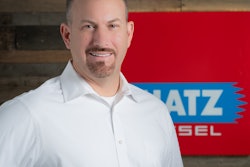
Global Markets
What are the key global markets your company sees as growth opportunities and why? Are there specific types of products/equipment on which it is focusing for these markets?
The mobile hydraulics industry as a whole has been successful for Bosch Rexroth, and our products are well received by the marketplace. Agriculture, construction and material handling equipment have always been applications that we do very well in. We see those as continuing to be a global key focus.
Government & Trade
Are there policies you are keeping your eye on that could impact (or have already impacted) your company, for the better or worse?
Government-level decisions regarding engine emissions, trade, commodity prices and so forth impact the end-user such as, for example, a farmer in the Midwest. If that farmer can’t get the price they need for soybeans or corn, they can’t buy new equipment. That has a direct impact on OEMs. As a manufacturer, we’re prepared to help OEMs meet the challenges these constantly shifting policies create.
Diesel, Electric and Other Power Alternatives
Diesel is clearly not going anywhere for several decades, but are there ways your company sees its use could further evolve or become cleaner to meet growing demand for fuels which have less of an impact on the environment?
Diesel will continue to be a fuel source as optimization of engines and emissions evolve. As regulations continue to impact the mobile market and evolve further, the need for alternative solutions to using fossil fuels or limiting them with electrics or hybrids will continue to grow. We’ll continue to work both on the hydraulics side and the electrics side to make the best use of the available energy from diesel engines or storage devices. We see hybrid technology growing as a possible crossover between where we currently are with diesel and how it will change for certain sizes and classes of machines in the future with electric drives. The solution really depends heavily on the methodology used to replace the energy being used.
The market continues to keep its eye on battery technology or other storage technology as it continues to evolve. As these develop or other ways to power machines come on to the market, we’ll continue to collaborate with OEMs to find the best methodology to transfer the available energy in the most efficient and effective way.
Are the diesel bans in cities around the world having an impact on how your company is designing its products? How so?
Many cities, mostly in Europe, have heavy restrictions on machines that limit diesel powered machines to run within their limits. This increases the need for electric drive technology. We work with OEMs to make sure we’re providing the latest technology to facilitate electric drives on machines of all sizes. In some cases, the smaller machines (i.e., compact construction equipment) can work inside buildings. In other cases, vehicles with a much larger power class are relied on. At the last bauma, we shared higher power class electric drive systems being developed to help larger machines in the transition to electric.
Are there any new emissions regulations your company sees on the horizon, or anticipates will have an impact on the industry? Europe is set to implement CO2 regulations for heavy-duty trucks in the next few years—does your company foresee a similar regulation affecting other industries, or another emissions element that will become the focus for regulators?
Regulations could make increasing impacts in countries that haven’t historically enacted policies, but realize the need to do so. Bosch Rexroth has already invested in mature markets and, as additional developing countries follow suit, we have the technology investments and system solutions to help meet that demand.
Does your company foresee electrification playing a bigger role in the coming years, and what is needed for it to become a more widespread technology in the heavy-duty vehicle industry?
We believe hydraulics will continue to play a vital, integral role in off-highway machines, but we are making strong investments in designing electric and hybrid electric/hydraulic platforms to make the best use of both technologies.
For mobile machines, the core issue of the challenge is in consideration of the available torque: transferring the available torque from the power source either to the ground drive or the machine’s implements that do the work. For instance, it could be transferring the available torque from the engine through the hydraulics to the ground drive to make the machine move, or it could be done from the battery side and then an electric motor provides movement for the ground drive — this is where we see good chances for electrification.
One of the advantages Rexroth has is that we can do either quite well. Our deep experience in systems and machine experience aid in applying hydraulics and electric drives. So, electrification for the ground drive is well on its way. On the implement side, going to full electric to make movements on the machine actuators will be more difficult. For instance, the power density from a hydraulic cylinder and actuator is so reliable and affordable to do that work and to move those loads that it may be a number of years until technology is far enough along that we can have electrically driven actuators that fit in the same space as a cylinder.
That’s not to say that a transition isn’t coming; the electric side is coming closer and closer. More importantly, battery technology must advance. You don’t want a situation where you have an agricultural sprayer or combine in the middle of the field and your battery runs out. That's why hybrids are a valid solution.
Data, IoT and Connectivity
What benefits does the internet of things bring into your company and/or the industry as a whole? And how do you see it continuing to be beneficial in the coming years?
From the mobile hydraulics standpoint, IoT helps us understand, for example, the single piece flow of a pump going through the build process. We know everything about that pump from day one, including internal components, serial number…everything.
For the industry as a whole, connectivity has been around for a long time in the agriculture market, from knowing where the machine is located and driven to knowing the yield rates. Now we have more information about the component side as opposed to just vehicle location and yield rates. We can give the end-user advantages, like predictive maintenance data or service side fleet management.
Are you seeing any new opportunities in regard to connectivity, and if so, what technologies are making these possible?
For Bosch Rexroth, IoT implementation is more about helping the industry, from our OEM customers to end-users. The benefit for us, of course, is sales because of our ability to provide the secure connectivity through the Bosch cloud. The sensors and the connectivity box are ready to be tied back through the machine, and then data transmitted to a secure cloud. And that secure transfer of data to and from the cloud is critical to prevent potentially dangerous situations, like a hacker hijacking the control of a machine. For us, the benefit is that we have opportunities for IoT services that did not exist before.
Automation & Smart Systems
What are customers/the industry looking for in smart systems, and how is your company going about providing those features?
One trend in smart systems is geofencing, which ensures a machine is operating in the right area. For example, if a GPS locator on the machine detects it has left a defined area because, say, the operator is inexperienced or a problem has occurred, that machine could shut down.
Also, when we start talking about automation and smart systems, we're talking about a level of risk that requires object detection — surround-sensing systems — like the comfort systems in the auto industry that warn a driver if they’re too close to an object. The future for smart and automatic-type systems could be technology that moves beyond camera-type systems to differentiate between a person or a tree.
What challenges are there yet to implementing more advanced automation capabilities and what is needed to overcome those challenges?
It’s great to have a monitoring system, but the challenge in automation is solving what happens when the machine goes off course. A monitoring system with object differentiation can determine if that object is a 2 x 4 or a pallet and then take proper action, such as going around it or crawling over it. It’s the same challenge if someone’s trenching through a field: How do you correct an unexpected course change?
The biggest components to the solution are the redundant sensors and controllers that allow for safe operation. We leverage our relationship with Bosch and their long investment in automotive safety technology to develop solutions for the off-highway market.
Challenges & Opportunities
Are there any technologies or trends which you are currently excited about in the heavy-duty vehicle industry, or most looking forward to seeing in the coming years?
The electric drive side continues to be a challenge and an opportunity for the electrics. This ground drive that changes from hydraulic drive to electric drive is exciting to build upon because we can be creative and not only use energy, but also store the energy as a vehicle slows down for instance. Methodologies from implementing this in traditional systems can transfer to electric drives.
An opportunity is to implement this with a storage technology and electric drives on larger machines that have been traditionally powered by diesel technology. Once we do that, maybe it even changes the way machines are built. Imagine a battery pack in the base of the unit that contains the ground drive and the upper structure is changed out based on what piece of equipment you need to use for the day, whether it's a skidsteer loader or a mini excavator for instance. However, opportunities exist with the continuing advancement of technology.
What challenges will continue to plague the industry for the foreseeable future? How do you anticipate these challenges will be overcome, or can they be overcome at all?
The change to electric is exciting for the future, but the challenge for the industry or larger off-highway equipment will be finding the most effective way to move and operate a large piece of equipment. Will that be electric because of the advance in battery technology? Or will it be limited by the ability to replace the energy that you're using? If it's a diesel, it's easy — simply fill it with fuel. With electric, it needs to be filled with some voltage/current source. Bottom line is how do I replace whatever I use? Is it just diesel fuel or is it energy from a shore power somewhere being connected? Will fuel cell technology come along? I think that part will challenge us for a while.
It will be especially challenging on equipment with heavier duty cycles. Take an aerial work platform that moves, stops and lifts. The duty cycle may be different, because it’s not running at full horsepower all the time, it’s intermittent. Or a skid steer loader that operates hard for a certain amount of time at one construction site but only intermittent at another. The question then becomes which prime mover do I use? Diesel, Electric or Hybrid?



















